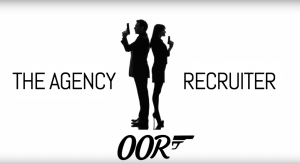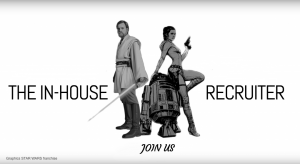5 Key things you should know
about In-House Recruiters.
Be on your full potential before and after job interviews!
A single conversation with a wise man is worth a month’s study of books. – A popular Chinese proverb.
Estimated reading time: 7 min 20 secs
Images and graphics: People Place Marketing Team

About James C.Lacek:
JC Lacek is a professional blogger, journalist, playwright, and comic book author. In addition to writing for the San Francisco based newspaper El Tecolote, JC has also been a regular contributor to the pop culture magazine Living Life Fearless and has had his fiction and personal essays published in literary magazines such as Writers Who Rock and Bat Country.
JC currently holds a playwriting residency at The Raleigh Playhouse & Theatre and writes the comic book series Jazz Legend for Scout Comics in New York.
Well, well, well… you’ve finally received that call from the in-house recruiter on that application you sent weeks ago. The screening went off without a hitch and now it’s time to get things together for your first in-person interview. Resume looks outstanding, check! Thorough research of the company plus technical details of the position, check! Hair is amazing and duds are fresh-to-death, check! Breath mints, check! It appears engines are full steam ahead to knock this interview out of the park, except for one tiny detail—understanding the minutiae of how in-house recruiters operate. And that is, my fellow career search sufferers, the reason why you are reading this, isn’t it? To guarantee you maximize your full potential during and after the recruitment process it’s paramount to have a firm grasp of what a recruiter does, what they’re looking for, and most importantly, what they’re not. To help us both out, I’ve decided to interview Eva Andreskova (Peoples’ Place – Recruitment Branch Manager and OM) and Tomas Cides (Talent Acquisition Director for CEE and People Place CEO) in order to get further insight into how the in-house recruitment process and actually works.
A single conversation with a wise man is worth a month’s study of books. – Chinese Proverb
 #1. Don’t expect career advice from an in-house recruiter
#1. Don’t expect career advice from an in-house recruiter
When first sitting down with an in-house recruiter you’ll likely have a short but friendly discussion about yourself, just enough to break the ice. Frankly, it would be impolite to start grilling you within the first 30 seconds without rubbing on a little butter first.
As cordial as this conversation may feel, this is probably not the time to confess your true passion for vintage shoes, tram spotting on full moons, dressing up as Wolverine, or any other “unusual” activity. It is without question that enthusiasm is vital to a successful interview, but it’s of equal importance to keep your head in the game: remaining focused on why you are there and particularly why your skills, experience and qualifications are pertinent to the position at hand. However inspiring your real dream job may be, the in-house recruiter’s job is to secure the information essential to making a decision on your candidacy, not to speculate your long-term ambitions or discuss topics which overlap with personal career consultancy.
It is also worth noting that before meeting with an in-house recruiter, take the necessary time to do your homework and understand if the job is genuinely a good fit for you. Realizing the position’s work schedule will interfere with your tree climbing lessons is not something which should arise mid-interview. This not only wastes everyone’s time but also risks damaging your impression on the recruiter as well as the possibility of consideration for further steps.
 #2. Not every recruitment process is created equal
#2. Not every recruitment process is created equal
So, your screening interview was a home run. Next step, in-person interview. Nailed it too! Things couldn’t have gone better in your opinion. You’re perfectly qualified for the job, demonstrated a thorough comprehension of the position’s requirements with charisma and confidence to spare—and then… well, nothing really… Weeks pass and still no word. Was is it something you did or said? Was it that you only spoke six languages and not seven? Before getting too carried away it is important to discern the recruitment process is just that, a process. Although you know you’re undoubtedly the perfect hire, it may take some time before an in-house recruiter is able to get the hiring manager’s availability to interview you.
At this stage in the game, it also helps to try and take things with a grain of salt. Yes, you may very well be the ideal candidate technically speaking, but it’s the in-house recruiter’s job to cover all of the necessary bases. For example, it could be you’re actually too good for the position or perhaps are asking for a salary outside of their range. There are several factors which must be considered in addition to how things appear on paper, so it’s always wise to temper expectations. A good practice is to always ask during the interview how long they predict the selection process could take in the worse scenario.
 #3. The recruiter may not know why you didn’t get the position
#3. The recruiter may not know why you didn’t get the position
Ok, so you didn’t get the job. Unfortunately, it’s an unavoidable part of the job hunt process which spares no man: but you want answers dang it! The truth is, recruiters aren’t always kept in the complete loop on the criteria of the hiring manager. A different candidate could have been chosen, the job’s description changed unexpectedly or the position has been cancell all altogether, all without the recruiter becoming privy until after the fact. There’s a multitude of reasons why the hiring managers may refrain from disclosing the details of their hiring process. So before going all Yosemite Sam on the recruiter, realize it was a decision which was most likely out of their hands.
 #4. In-House vs. Recruitment Agency recruiters
#4. In-House vs. Recruitment Agency recruiters
Understanding how you should approach your interview greatly depends on knowing the key differences in the type of recruiter you’re working with, in-house or agency. Although their jobs are similar—(connecting job providers with job seekers) — their motivations, and processes differ. As a candidate, it’s hugely beneficial to recognize the distinction and adjust your approach with each one accordingly. I’ll describe, in a nutshell, their weapons and specialities.
 Agency Recruiters, are usually employed by staffing agencies or recruitment firms. You can easily differentiate GOOD ones from BAD ones from the minute you sit down with them. For example, if you are sitting with an agency recruiter armed with a laptop who hardly looks at your face while he/she punches your answers in the database… Run! Run Forrest Run!
Agency Recruiters, are usually employed by staffing agencies or recruitment firms. You can easily differentiate GOOD ones from BAD ones from the minute you sit down with them. For example, if you are sitting with an agency recruiter armed with a laptop who hardly looks at your face while he/she punches your answers in the database… Run! Run Forrest Run!
The Good ones will spend a considerable part of the interview chatting with you in a relaxed manner, taking notes from time to time while they interview you without hardly noticing it. They are essentially your ally to match your talent and priorities with an ideal company and a position that’s right for you. They are, therefore, your career advisors, consultants and the ones you should open up right from the start in order to help them present you with the best possible opportunities to choose from.
They are pretty much like your personal coach. Their goal is to help shape your career utilizing a combination of job market knowledge and their understanding of how in-house recruiters and hiring managers work at the highest levels. Why would they do that for you? Simple! The better job they get you the higher their bonus (everyone wins)
 In-House Recruiters, on the other hand, should be viewed as extensions of the company for which you are applying as they are the ones signing their paychecks. When working with an in-house recruiter it’s a wise practice to communicate with them professionally, in the same manner you would with any other high-level representatives of that company. Now is probably not the time for bringing up the rumors you’ve heard about the Supervisor of the department who likes wearing a ballerina tutu on casual Fridays or that the only coffee in the office is Nescafé.
In-House Recruiters, on the other hand, should be viewed as extensions of the company for which you are applying as they are the ones signing their paychecks. When working with an in-house recruiter it’s a wise practice to communicate with them professionally, in the same manner you would with any other high-level representatives of that company. Now is probably not the time for bringing up the rumors you’ve heard about the Supervisor of the department who likes wearing a ballerina tutu on casual Fridays or that the only coffee in the office is Nescafé.
Remember, their chief objective is locating the absolute ideal candidate for the position they are covering while maintaining hiring vision, e.g. reducing the time to fill the position, maintaining the assigned cost per hire, aiming at maintaining or even increasing talent retention rate and of course the hardest thing…making sure the hiring manager satisfaction is at the highest level at all times. All this while making sure you the candidate is very satisfied with the interview process experience, regardless of the outcome. To be honest, much much easier said than done!
 #5. Their role isn’t to be an expert on the job in question, but to fill it
#5. Their role isn’t to be an expert on the job in question, but to fill it
As has been outlined in the article, an in-house recruiter’s principal goal is to find talent, give interviews, and then present the company with a shortlist of candidates. Although they are armed with the information and materials essential to the recruitment process, this doesn’t mean they have a firm grasp on the nitty-gritty details of the position. Despite the fact that you may have a burning desire to know which algorithm the company plans to integrate for the purpose of streamlining dataset integration, don’t be surprised if the recruiter doesn’t have that information or comprehend what you’re talking about. You should, of course, feel inclined to ask questions you feel are important to the position but be prepared for the more technical ones to be referred back to the company’s hiring manager for further clarification.
In closing, whilst in-house recruitment will differ from company to company and job to job one thing is a constant, understanding the process only benefits your chances of landing the position. Considering the many factors in play when making a hire, there is really just one simple rule of thumb which always applies: Bring your A game, cross your T’s and dot your I’s, and most importantly show off that big beautiful smile of yours because you’re worth it!








